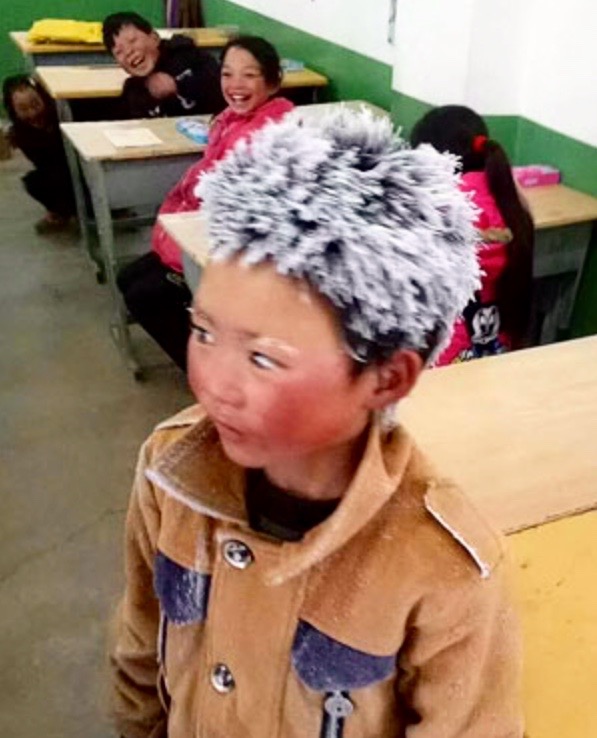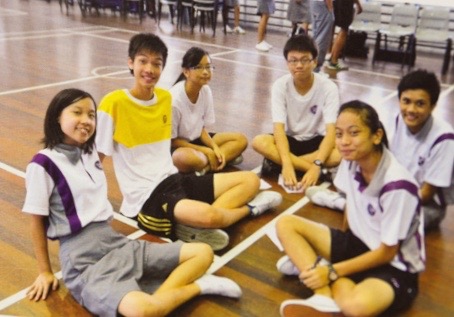Snowflake Boy’s grit missing here? Not true, say teachers
by Juleen Shaw // January 26, 2018, 11:49 pm

A photo of Wang Fuman, posted by his principal, showing his frost-covered head after he walked for an hour in freezing temperatures for an exam. Photo: Weibo
You’ve seen the picture: Little Wang Fuman, dubbed Snowflake Boy, with a headful of icicles, snow-speckled eyebrows and cheeks red-raw from winter frost.
The eight year old had walked 4.5 km for an hour in minus 9°C temperatures to get to his school in mountainous Yunnan, China, for his final examination.
His teacher photographed him (to some hilarity among his classmates) and the picture quickly went viral on social media, and was subsequently picked up by news agencies around the world.
Fuman, a “left behind” child, lives with his sister and grandmother in a mud house in impoverished Ludian town. He is one of 9,338 “left behind” children in rural Ludian whose parents work in the city, leaving the children in the care of aged grandparents.
When young Fuman’s story hit local newspapers, Singapore parents everywhere turned to their school-aged children and said: “See this poor boy? No student in Singapore has this kind of determination!”
But you’d be surprised, say teachers here.
Determined despite the odds
While disadvantaged schoolchildren in Singapore have the benefit of government and school financial assistance schemes covering fees, programmes and even recess meals, some of these children’s challenges cannot easily be solved by financial aid.
And that’s when they either give up … or pull out grit from their innermost reserves.
“There was a girl in my leadership programme a few years ago. Her parents were not in good health and they could not work,” recalled Mr Kuak Nam Jin, head of a junior college leadership programme. “Her family was financially tight but that never stopped her from chasing after what she wanted.
“She was a cheerful girl, humble and very caring. She had always wanted to be a doctor because she wanted to be in a position to do something for her parents and for those in need.
“During the mountain trekking phase of our leadership programme, I noticed that she was walking slower by the day. On the fifth morning, I asked her to remove her shoes. She had two big blisters on her feet and only broke into tears when I released the pressure. She went on to walk the next four days without ever complaining about the pain she was enduring.
“I see the grit in these students in their daily effort to keep their lives in order despite challenges.”
“When I met her a few years after her ‘A’ levels, she told me she was in her third year in medical school. She was not taking any allowance from her parents but earning her keep by teaching music and giving private tuition between classes.”
He added: “I know she will be more than alright because of her determination and heart. She is a good person and will be a good doctor.”
Mr Chew Hiap Iuh, a polytechnic teacher, has also come across students with exceptional determination. A number of students in his polytechnic are receiving financial assistance.
One student works after school and on weekends to supplement the family income. She often skips lunch, saying she is fasting, but the teachers know she does not have money to eat.
“Another student I know has nine other siblings, “ said Mr Chew. She is the eldest and has to work during the school term to bring in income for her family. Sometimes she has to skip school to babysit her younger sister.
“She has failed some subjects but has held on, hoping to graduate. She is smart but is often worn out by her responsibilities. Coming to school is a challenge in itself.
“I see the grit in these students in their daily effort to keep their lives in order despite challenges.”
Failure is no excuse
Ask the teachers at NorthLight School about grit, and they have plenty of stories to tell.
NorthLight admits students who have failed their Primary School Leaving Examination (PSLE) once, twice, sometimes three times, and have been deemed “not suitable to progress to secondary school education or to re-attempt the PSLE”.
Students arrive at the secondary school with all kinds of challenges – physical, mental, financial, social – and have faced failure time and again. The school prepares its students for employability, giving students the chance to work towards an ITE Skills Certificate within four years.
Mrs Chua-Lim Yen Ching, the founding principal of NorthLight School, led her team of stalwart staff through many a challenge to both students and teachers.
One of the students whose grit inspired both staff and students is Lydia Ang.
Lydia suffers from hydrocephalus meningitis, an inflammation of the membranes of the brain and spinal cord. Untreated hydrocephalus has a 50-60% mortality rate. The 40-50% who survive have varying degrees of intellectual, physical and neurological disabilities.
“When Lydia arrived at NorthLight School at the age of 14, she was very fragile and weak because of her condition and her surgeries. She had to have shunts put in her scalp to help drain the accumulated fluid,” recalled Mrs Chua.

Lydia (far left) with fellow counsellors at NorthLight School
“Many children look forward to the school holidays, but not Lydia, because during every holiday she had to go to the hospital to check that there was no new accumulation of fluid in other parts of her brain.
“She could not walk upright and could not even raise her head at that time. She was also very quiet. I was worried. I wasn’t sure she could take the rigours of school.”
“You have to try”
But Lydia herself was thrilled about starting school at NorthLight.
“After I failed my PSLE, I didn’t know whether I could continue studying or whether I had to stay at home. So I was happy when my mum told me that I could go to school,” she said.
“On my first day at NorthLight, I remember thinking that this school is very big.”
Most students would not have bat an eyelid at the few steps leading down to the canteen and up to the classrooms. But to Lydia, who walked with a limp from severe scoliosis and had to pull herself up stairs using her arms, the walk to the hall and classrooms seemed interminable.
This she did every day in school despite a phobia of stairs arising from a bad fall at home, when she missed three steps on the way to the lift and fell, knocking her head against the cement staircase so that she bled profusely.
“They might have failed an examination but they did not fail in life.”
She could not play sports because of her weak legs, but would good-naturedly cheer her friends on from the sidelines and watch their belongings.
Despite her physical challenges, Lydia pleaded with the school to allow her to go on the outdoor adventure camp with her cohort.
“It was a once-in-a-lifetime thing!” remembered Lydia. “Mrs Chua said: ‘Okay, you can go, but you must bring someone with you’, so my mother and sister came along!”
Lydia was game for everything, and even attempted rock climbing with the help of a harness.
When she expressed the desire to go on the water raft, she was put in the centre of the raft … surrounded by her teachers.
“I wanted to try, just for the experience,” quipped Lydia, who said that what kept her going, despite some discouraging instances, was to “tell yourself if you have an opportunity to do something new and good, just try”.
An avid singer, Lydia joined the school’s performing arts group, Northstarz, and was selected to perform at NUS under the guidance of the Guildhall School of Music and Dance from the UK. She also gave a solo performance at the Mensa anniversary dinner and performed at the Youth Olympic Games Unveiling of the Torch Design Ceremony.
Upon graduation, Lydia joined the Food and Beverage (F&B) industry, working at Aston’s, the Kentucky Fried Chicken outlet in Downtown East, as well as the Nanyang Girls’ High School canteen.
She would wake up at 5.30am, leaving her Bedok home by 6am in order to take a one-and-a-half hour bus ride to Nanyang Girls’.
Now 24, Lydia works at social enterprise and wheelchair-friendly café My NoNNa’s as a server, taking two buses daily to the café, located within the Singapore University of Technology and Design (SUTD) in Changi.

Lydia (right) at My NoNNa’s cafe with her boss and cafe owner, Geraldine (left)
Ms Geraldine Tan, founder of My NoNNa’s, praised Lydia for her positive attitude, adding that customers liked Lydia for her cheerfulness. Lydia did not even have use of her left hand when she first joined the café, but can now hold a few plates and cutlery.
Said Mrs Chua: “In school, Lydia was an inspiration to her friends. This was a child who displayed true perseverence. She was always cheerful in spite of her condition.”
In her 24 years, Lydia has had 33 surgeries to her head, stomach, back and neck. But she is determined to live life to the fullest.
“My dream is to become a singer and also a worship leader in my church,” said Lydia, who attends Pentacost Methodist Church. “My father’s favourite song is: Thank You for the Cross.
“When I feel like giving up, I ask God for strength,” she said. “I cannot depend on people to live my life for me. There is no point dwelling on my situation. In life, you have to try. And if you try and you cannot do it, it’s also okay.”
NOTE: This is the first story in a two-part series on children with grit, and the teachers who journey alongside them. You can read the second story here.
NorthLight School
There is a story in Salt&Light that talks about a Singapore with Hope and Heart. Well NorthLight (NLS) is a School with Hope and Heart.
Dubbed a “last chance school”, NorthLight, a secular school for all races, has seen many students walk through its gates burdened by numerous life challenges.
But many have walked out after four years transformed through nurturing and education.
In a reflection of the students’ grit, the school logo features the colours of purple and white, to signify the stars (white) that shine when the sky is darkest (purple).
“The darker it gets, the brighter they shine,” said Mrs Chua-Lim Yen Ching, a Christian and the founding principal, who led her staff through uncharted educational territory from 2006 to 2011.
“Central to the structures and processes was to engage these students who have just failed a major examination and invariably saw defeat and hopelessness in their future,” said Mr Lau Khai Meng, vice principal of administration from 2007 to 2012, in NLS’ 10th anniversary book, Empowering Youth for a Future.
“We set the policy that the school admission criterion was to enroll the academically weakest students in the event that we had oversubscription.
“Ultimately, our underlying intent was to convey to these students that they might have failed an examination but they did not fail in life.”
We are an independent, non-profit organisation that relies on the generosity of our readers, such as yourself, to continue serving the kingdom. Every dollar donated goes directly back into our editorial coverage.
Would you consider partnering with us in our kingdom work by supporting us financially, either as a one-off donation, or a recurring pledge?
Support Salt&Light


